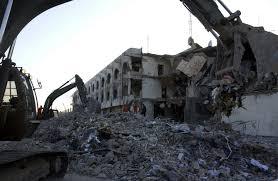
By: The TPS News Team
Syria in 2011 seemed like it was playing host to a democratic movement seeking the removal from power of longtime dictator Bashar al-Assad and his replacement with a government more responsive to the concerns of the ordinary people, however, as the regime began cracking down hard on the at-first peaceful protests, some of the protestors decided to take up arms against the man they considered their oppressor and his regime, launching a civil war between the at-first moderate protestors and the brutal regime of the longtime dictator. As weeks turned into months and then into years, radical Muslims began seeing in Syria the golden opportunity they had been waiting for since their attempt to derail the American presence in Iraq had failed in 2007, eventually taking over large swathes of Syria and establishing in those areas the radical Islamic law which they had been dreaming of implementing for decades.
Then, in early 2014, the radical Islamist group ISIS, or the Islamic State of Iraq and Syria made their epic comeback in Iraq, taking over the large Iraqi city of Fallujah and then the nearby large city of Ramallah before making a huge play for Western and Northern Iraq in mid-summer which ended with them controlling large areas of Iraq and connecting those territories with those they already had in Syria, thereby establishing the Islamic State which they had so long dreamed of. Now the Iraqi military is just starting to fight back in a serious manner against ISIS after their humiliating retreat from some of Iraq’s largest cities, but it seems like ISIS is not going down without a fight, stirring up the emotions of Iraq’s Sunni minority, which has been largely neglected by the central government in Baghdad, and trying to draw the Shias into a potentially catastrophic sectarian conflict by threatening to destroy some of their holiest religious sites.
To clarify, Shiism and Sunnism are the two main branches of Islam, with Sunnis making up 85%-90% of the world’s Muslims and Shiism being the often-repressed minority sect. Despite the fact that Sunnis make up the vast majority of the world’s Muslims, Shiites make up a large percentage of the population in Iraq and Iran, so Sunnis have been the ones claiming to not have a voice in Iraqi politics since the Shiite politician Nouri al-Maliki became the country’s Prime Minister in 2006.
While ISIS sits a mere matter of miles away, politicians in Baghdad have spent the first week of July arguing without result about the makeup of their next government, with al-Maliki wanting to keep his job and Sunnis wanting him out. Meanwhile, Iraq’s Kurds, who are the third force in Iraqi politics and are members of a unique ethnic group which extends from Eastern Turkey to Western Iran, are preparing for a referendum on independence from Baghdad, claiming that the stability and security their region has enjoyed since very early on after Saddam’s ouster shows that they are capable of managing their own state
It remains to be seen what results from all this transnational chaos but the first step in any attempt to resolve the situation would be an Iraqi Parliamentary decision on the makeup of their new government, which should occur within the next few weeks. As always, TPS will be here to keep you posted as all this continues to unfold.
